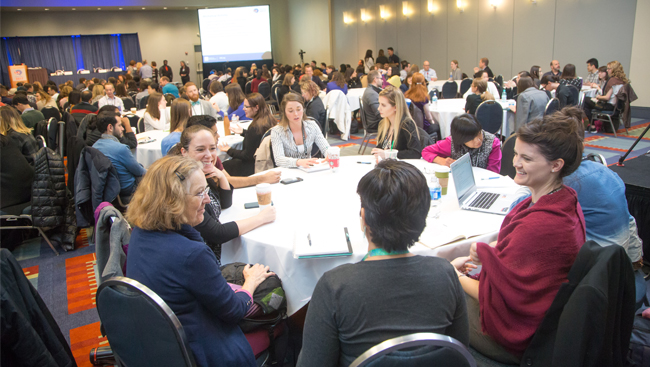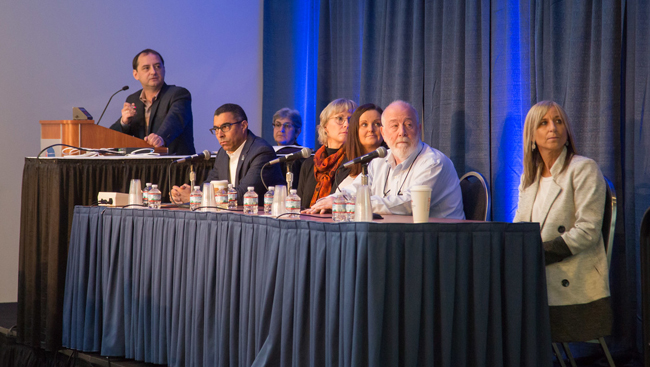Global Approaches for Collaboration and Networking
- Featured in:
- SfN Annual Meeting Recordings
Apr 10, 2018
In this Neuroscience 2017 event, Women in World Neuroscience (WWN), an independent mentoring and networking organization that provides opportunities for neuroscientists across the world, highlights the potential of developing strategic collaborations, identifies funding sources, and provides strategies for establishing successful research networks.
Speakers

Emmeline Edwards, PhD
Emmeline Edwards is director of the Division of Extramural Research of the National Center for Complementary and Integrative Health (NCCIH). In that capacity, she is responsible for development of scientific programs or areas of science that fulfill NCCIH’s mission as well as planning, implementation, and policy. NCCIH is one of 27 components of the National Institutes of Health (NIH), with a mission to define, through rigorous scientific investigation, the usefulness and safety of complementary and integrative health interventions and their roles in improving health and health care.
Edwards earned her PhD in neurochemistry from Fordham University, did postdoctoral research in behavioral pharmacology and neuroscience at the State University of New York, and was a tenured associate professor in the department of pharmacology at the University of Maryland. Her research there focused on the neural mechanisms of complex behaviors and characterization of a genetic model of affective disorders. She also served as chair of the Graduate Studies and Research Committee and a member of the Dean’s Executive Council at the University of Maryland. Currently, Edwards is also chair of Women in World Neuroscience (WWN), an independent mentoring and networking organization with the primary mission of identifying, promoting, and implementing mentoring and networking opportunities for women neuroscientists across the world.

Martha I. Dávila-García, PhD, FASPET
Martha I. Dávila-García, PhD, received her PhD in biology and neurosciences from New York University in 1989. She joined the faculty of the pharmacology department at Howard University College of Medicine in 1999 and is presently an associate professor in the Department of Pharmacology and Director of Graduate Programs. Dávila-García’s research focuses on the reward-addiction pathways and on the consequences of nicotine exposure to synaptic plasticity, neuronal function, and the central control of cardiorespiratory function. Her lab also develops new compounds for nicotinic receptors. Dávila-García has been awarded several foundation awards and has been funded by the NIH, American Heart Association, and the Pharmaceutical Industries. Dávila-García has served as journal peer reviewer and NIH grant reviewer. She is a member of various scientific organizations such as ASPET, SfN, APS, NYAS, SONA, and FENS. She is a Harvard Macy Institute alumna. She was in the board of directors of SACNAS, was a member of Executive Committee-Neuroscience division for ASPET, she is the current chair of the Nominations and Leadership Steering Committee for AAAS, and she is one of the founders and an executive leader of the World Women in Neuroscience (WWN). Dávila-García, in collaboration with Robert P. Biney, has organized two IBRO-ARC sponsored schools in Africa on “Neuropharmacology Research and Drug Development.”

Orly Weinreb, PhD
Orly Weinreb is the vice president of R&D at NeurOptic, Ltd., and a senior lecturer at Technion Israel Institute of Technology. Weinreb is a leading neuroscientist researcher and took major part in the research and development of the anti-Parkinson’s drug rasagiline (Azilect®). She earned her BS, MS, and PhD at Technion Israel Institute of Technology.

Pamela Butler, PhD
Pamela Butler is an associate professor of psychiatry at New York University School of Medicine and a research scientist at the Nathan Kline Institute for Psychiatric Research. She received her PhD in psychology from the City University of New York and did postdoctoral fellowships at Duke and Columbia universities. Her research centers on understanding deficits in perceptual and social function in schizophrenia. She currently has NIH grants to study perceptual cognitive remediation in schizophrenia and social reward learning in schizophrenia. She also teaches science writing at New York University.

Jean King, PhD
Jean King an active neuroscientist and Peterson Family Dean of Arts and Sciences at Worcester Polytechnic Institute. Previously she was vice provost of biomedical research and a professor of psychiatry, radiology, and neurology at the University of Massachusetts Medical School. King’s current research interests include the use of novel multimodal neuroimaging techniques to explore the impact of stressors and addiction on neural networks, as well as neural mechanisms underlying comorbidity in disorders such as attention deficit hyperactivity disorder and traumatic brain injury. She received her doctorate in neurophysiology from New York University and completed postdoctoral training in translational neuroscience at Emory University.
4 of 5 articles left
Login
or
Become a Member
to unlock content





.png?h=1763&w=3125&la=en&hash=B2439C2768576BED6405672E5CD5CF8CB1AA375F)




